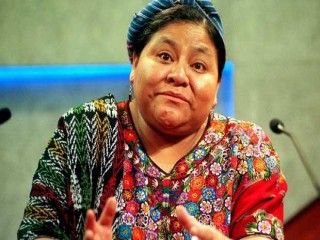
Rigoberta Menchu Tum biography
Date of birth : 1959-01-09
Date of death : -
Birthplace : Chimel, Guatemala
Nationality : Guatemala
Category : Famous Figures
Last modified : 2011-09-22
Credited as : human rights activist, UNESCO goodwill ambassador, Nobel Peace Prize
1 votes so far
Menchú has dedicated her life to publicizing the plight of Guatemala's indigenous peoples during and after the Guatemalan Civil War (1960-1996), and to promoting indigenous rights in the country. She received the 1992 Nobel Peace Prize and Prince of Asturias Award in 1998. She is the subject of the testimonial biography I, Rigoberta Menchú (1983) and the author of the autobiographical work, Crossing Borders. Later, American anthropologist David Stoll visited Guatemala and uncovered evidence that some of the claims presented in Menchú's Nobel Prize-winning testimonial were inaccurate or false.
Menchú is a UNESCO Goodwill Ambassador. She has also become a figure in indigenous political parties and ran for President of Guatemala in 2007.
Rigoberta Menchú soon became involved in social reform activities through the Catholic Church, and became prominent in the women's rights movement when still only a teenager. Such reform work aroused considerable opposition in influential circles, especially after a guerilla organization established itself in the area. The Menchú family was accused of taking part in guerrilla activities and Rigoberta's father, Vicente, was imprisoned and tortured for allegedly having participated in the execution of a local plantation owner. After his release, he joined the recently founded Committee of the Peasant Union (CUC).
In 1979, Rigoberta, too, joined the CUC. That year her brother was arrested, tortured and killed by the army. The following year, her father was killed when security forces in the capital stormed the Spanish Embassy where he and some other peasants were staying. Shortly afterwards, her mother also died after having been arrested, tortured and raped. Rigoberta became increasingly active in the CUC, and taught herself Spanish as well as other Mayan languages than her native Quiche. In 1980, she figured prominently in a strike the CUC organized for better conditions for farm workers on the Pacific coast, and on May 1, 1981, she was active in large demonstrations in the capital. She joined the radical 31st of January Popular Front, in which her contribution chiefly consisted of educating the Indian peasant population in resistance to massive military oppression.
In 1981, Rigoberta Menchú had to go into hiding in Guatemala, and then flee to Mexico. That marked the beginning of a new phase in her life: as the organizer abroad of resistance to oppression in Guatemala and the struggle for Indian peasant peoples' rights. In 1982, she took part in the founding of the joint opposition body, The United Representation of the Guatemalan Opposition (RUOG). In 1983, she told her life story to Elisabeth Burgos Debray. The resulting book, called in English, I, Rigoberta Menchú, is a gripping human document which attracted considerable international attention. In 1986, Rigoberta Menchú became a member of the National Coordinating Committee of the CUC, and the following year she performed as the narrator in a powerful film called When the Mountains Tremble, about the struggles and sufferings of the Maya people. On at least three occasions, Rigoberta Menchú has returned to Guatemala to plead the cause of the Indian peasants, but death threats have forced her to return into exile.
Over the years, Rigoberta Menchú has become widely known as a leading advocate of Indian rights and ethno-cultural reconciliation, not only in Guatemala but in the Western Hemisphere generally, and her work has earned her several international awards.
From Les Prix Nobel. The Nobel Prizes 1992, Editor Tore Frängsmyr, [Nobel Foundation], Stockholm, 1993
This autobiography/biography was written at the time of the award and later published in the book series Les Prix Nobel/Nobel Lectures. The information is sometimes updated with an addendum submitted by the Laureate.
Awards:
Nobel Peace Prize 1992
Hague Appeal for Peace Honorary Committee
















